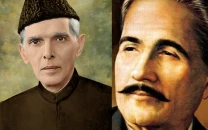Cricket corruption trial: Nicked, caught, maybe imprisoned
Salman Butt and Mohammad Asif found guilty of taking bribes for spot-fixing; Mohammad Amir had already confessed.

Cricket corruption trial: Nicked, caught, maybe imprisoned
When the scandal broke, the trio somewhat naively thought they could make a swift return to the cricket pitch. Now they face the prospect of a few years behind bars.
Salman Butt and Mohammad Asif were found guilty on Tuesday by a unanimous verdict on the charge of “conspiracy to cheat”. A 10-2 majority decision was returned on the charge of “conspiracy to obtain and accept corrupt payments”. The players showed no emotion when the verdicts were read out.
Mohammad Amir, who pleaded guilty to the two charges before the trial began, will now be given a “Newton Hearing” in which the judge hears his side of the story and no official jury is present.
The jury took 16 hours and 56 minutes to debate the verdict, with the judge, Justice Cooke, expected to sentence the players on Wednesday (today) or Thursday. Butt and Asif face up to seven years in jail or large fines; Amir may also face prison, though his guilty plea could induce a reduced sentence. The trio have already been banned from playing by the International Cricket Council for a minimum of five years.
The spot-fixing plot was orchestrated by Butt and sports agent Mazhar Majeed, London’s Southwark Crown Court was told. The jury heard how an undercover reporter recorded Majeed brag about arranging for Pakistan players to rig games for money. Majeed said he had been fixing matches for over two years and had made “masses and masses of money.”
Majeed promised the reporter that Asif and Amir would deliver three no-balls at specific points during the Lord’s Test in England last year. The no-balls were bowled as promised, with the probability of someone predicting this by chance estimated by a cricket statistician as 1.5 million to one. Butt and Asif denied any involvement in the plot, leading to the nearly month-long trial.
The guilty verdicts came on the day Butt’s wife Gul gave birth to their first son in Lahore. “It is a day of sadness and happiness for us,” Butt’s father Zulfiqar Butt told Reuters.
The ‘vulnerable 18-year-old’
Amir’s perspective will now be heard directly by the judge. Legal media restrictions, intended to ensure the jury was not influenced, meant that Amir’s plea could not be publicised before the case finished.
“Amir wants to make it clear he wants to take full responsibility for what he did by bowling two deliberate no-balls,” Amir’s barrister Ben Emmerson QC said at the pre-trial.
“This vulnerable 18-year-old boy, as he was then, was subjected to extreme pressure from those upon whom he should have been able to rely. He recognises the damage he has caused Pakistan cricket and he wishes to do his best to put that right.”
Other players under scrutiny
Pakistan cricket followers hoping to draw a line under Tuesday’s verdict may have to wait a little longer.
The ICC’s anti-corruption and security unit is set to launch further investigations into Pakistan’s ill-fated 2010 tour of England. Text messages recovered during the trial revealed that more Tests might have been affected by spot-foxing.
During the trial tapes emerged in which Majeed boasted he “controlled” seven Pakistan players: Kamran and Umar Akmal, Wahab Riaz and Imran Farhat, in addition to Butt, Amir, and Asif.
Published in The Express Tribune, November 2nd, 2011.



















COMMENTS
Comments are moderated and generally will be posted if they are on-topic and not abusive.
For more information, please see our Comments FAQ